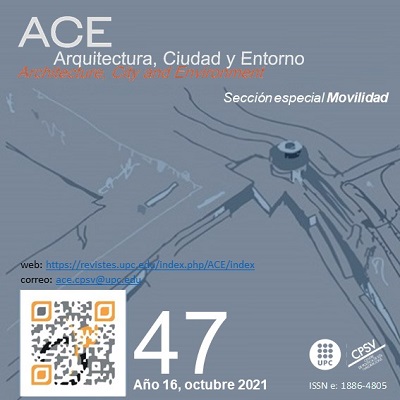Es comprèn el paper de la planificació urbana en el foment de l'envelliment actiu? Una revisió comparada de les iniciatives internacionals per a entorns age-friendly
DOI:
https://doi.org/10.5821/ace.16.47.10337Paraules clau:
Planificació urbana, urbanisme multigeneracional, persones grans, envelliment actiuResum
Després de revisar la literatura sobre entorns urbans age-friendly, els seus antecedents teòrics, i les teories de planificació relacionades, i analitzar les sis principals iniciatives internacionals sobre aquesta qüestió a través de l'anàlisi qualitativa de documents (QDA), l'article sosté que l'urbanisme es manté al marge del discurs interdisciplinari sobre envelliment i entorn. No obstant això, hi ha un ampli consens sobre la necessitat de certes característiques per a una planificació urbana age-friendly: compacitat, densitat i diversitat. Els orígens daquests criteris generals són múltiples. A nivell teòric, són el resultat del desenvolupament continu del concepte “d'envellir al lloc”, però també provenen de la pròpia teoria de la planificació urbana, en particular, de la planificació multigeneracional, que es basa en premisses de creixement intel·ligent. Més enllà d'aquests criteris generals, alguns instruments de planificació específics poden contribuir decisivament a desenvolupar un enfocament més integral amb la vellesa, com ara la zonificació inclusiva o el desenvolupament orientat al trànsit. No obstant això, hi ha una bretxa notable entre el marc teòric i la seva implementació. La planificació urbana té un paper més petit en moltes d'aquestes iniciatives internacionals. Es podria concloure que no hi ha un enfocament integral del potencial de la planificació urbana ni cap desenvolupament o anàlisi en profunditat d'un model de planificació urbana amigable amb la gent gran als programes internacionals més rellevants.
Descàrregues
Publicades
Número
Secció
Llicència
| CRITERIS DE PROTECCIÓ INTEL·LECTUAL |
En aquest moment es compta amb la protecció de la Oficina Espanyola de Patents i Marques, mentre que la protecció global s'està tramitant davant la Organització Mundial de la Propietat Intel·lectual (OMPI/WIPO). Així mateix, la Oficina del Número de Sèrie Estàndar Internacional (ISSN) ha otorgat els següents números: 1886-4805 (versió electrònica) i 1887-7052 (versió en paper). |
| COPYRIGHT |
El contingut dels articles i els comentaris en ells expresats són responsabilitat exclusiva dels seus actors, i no reflexen necessariament la opinió del Comité Editor de la revista. Els treballs publicats per ACE queden sotmesos a la llicència CC BY-NC-ND 3.0 ES http://creativecommons.org/licenses/by-nc-nd/3.0/es/ La qual cosa vol dir que les persones autores només tenen i retenen els drets d'autor dintre de les limitacions imposades per la anterior llicència |


































